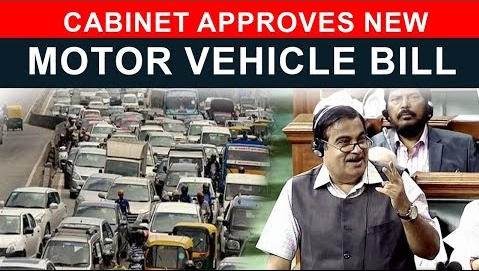Table of Contents
Q- In which among the following cases the bill is going to lapse?
A)- A bill originated and passed by the Lok Sabha but pending in the Rajya Sabha.
B)- A bill pending in the Rajya Sabha but not passed by the Lok Sabha.
C)- A bill passed by both Houses but pending assent of the president.
D)- If the president has notified the holding of a joint sitting before the dissolution of Lok Sabha.
WHAT HAPPENED TO THE 2016 BILL?
- The 2016 Motor Vehicle Amendment bill was passed by the Lok Sabha in 2017.
- But the govt. couldn’t pass it in the Rajya Sabha as it lacked majority.
- Hence bill lapsed.
WHY THERE IS A NEED FOR AMENDMENT?
CHANGING SCENARIO
- Motor Vehicles Act, 1988 is inadequate with current issues.
- Penalties for violation of rules is quite low.
- Multiple licenses are held by one person.

INCREASING NUMBER OF FATAL ACCIDENTS
- As per the Report ‘Road Accidents in India-2016’, road accidents in India have decreased by 4.1% in 2016 from 2015. However, fatalities resulting from these accidents have risen by about 3.2%.
- World Bank report says, road accidents cost India about 3% of its GDP.

INTERNATIONAL AGREEMENTS
- India is the Signatory to the Brasilia Declaration on Road Safety.
- Accordingly India is committed to reduce the number of fatalities and serious injuries to 50% by 2020.
- Sustainable Development Goal 3.6– Reduce Road crash deaths by 50% by 2020
ACCOUNTABILITY
- There is no provision in the Motor Vehicles Act 1988 to hold road contractors liable for defects in construction and maintenance.
- As per the survey, designing fault caused 1289 accidents in 2016.
MOTOR VEHICLES BILL, 2019
HIGHER AND ADDITIONAL PENALTIES
- The fines have been increased by a substantial amount by almost 10 times on certain offences.
- For drink & drive from ₹ 2000 to ₹ 10,000.
- For over speeding ₹ 5000 instead of the current ₹ 500 penalty.
- For not wearing a seatbelt or a helmet – ₹ 100 to ₹ 1000.
- Not giving way to emergency services such as an ambulance will attract a fine of ₹ 10,000.

NEW RULES FOR ISSUING DRIVING LICENCE
- Use of Aadhar number will be mandatory for applying for driving licence and vehicle registrations.
- The bill also reduces the validity of the driving licence from the current 20 years to just 10 years.

RECALL FOR DEFECTIVE VEHICLES
- Bill mandates a voluntary recall by the manufacturer to address the issue in case of a factory defect.
- In case of a defective model sold, complete reimbursement should be made to buyer.
- Also the government could levy a fine of up to ₹ 500 crore in such a scenario.

OTHER PROVISIONS
- Guardian/owner will be deemed to be guilty in case of road offence by juveniles.
- To help the road accident victims, good Samaritan guidelines have been incorporated in the Bill.
- The driving training process has also been strengthened under the proposed law.
- For offences committed by enforcing authorities, the fine has been proposed to be double.
SHORTCOMINGS IN THE BILL
- It does not talk about the enforcement and does leave out loopholes.
- Concerns have been raised if increasing the fines is the only way to go.
- Issue with the infrastructure itself that is yet to be standardised across the country.
Q- In which among the following cases the bill is going to lapse?
A)- A bill originated and passed by the Lok Sabha but pending in the Rajya Sabha.
B)- A bill pending in the Rajya Sabha but not passed by the Lok Sabha.
C)- A bill passed by both Houses but pending assent of the president.
D)- If the president has notified the holding of a joint sitting before the dissolution of Lok Sabha.
Latest Burning Issues | Free PDF






















 WhatsApp
WhatsApp